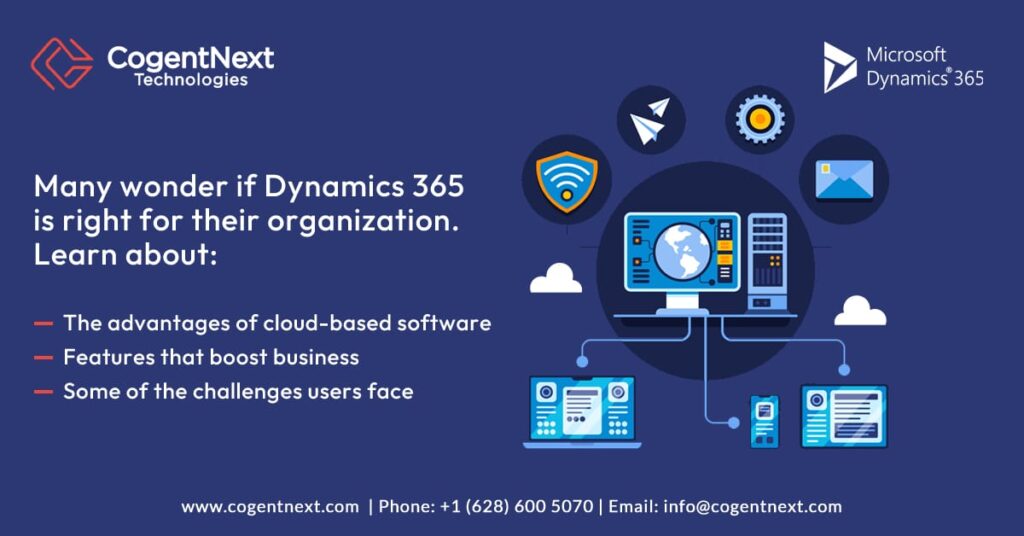
Exploring the Pros and Cons of Microsoft Dynamics 365 for Your Business
In today’s dynamic business landscape, technology plays a pivotal role in shaping success. Microsoft Dynamics 365 has emerged as a comprehensive solution for a wide range of businesses with both advantages and drawbacks. In this article, we delve into the world of Microsoft Dynamics 365, examining how it can transform your operations, comparing it to on-premises solutions, and uncovering the pros and cons of Microsoft Dynamics 365
As businesses strive to stay ahead in a competitive market, tools that streamline processes and enhance efficiency become paramount. Microsoft Dynamics 365 stands as a versatile solution embraced by various enterprises. This integrated cloud-based platform brings together Customer Relationship Management (CRM) and Enterprise Resource Planning (ERP) functions, revolutionizing the way businesses operate.
How Microsoft Dynamics 365 Helps Businesses Organize and Streamline Their Processes
Picture a cohesive ecosystem that aligns processes, centralizes data, and bridges communication gaps. Microsoft Dynamics 365 achieves just that. Acting as a unified CRM and ERP system, it empowers businesses to break down silos and foster collaboration. Especially beneficial for distributed workforces and global branches, this solution ensures seamless coordination amidst rapid changes.
Imagine being able to respond promptly to shifting customer demands and accessing up-to-date information anytime, anywhere. Microsoft Dynamics 365 doesn’t just promise this – it makes it a reality. By consolidating information, enhancing frontline employee interactions, and providing valuable tools for productivity, it streamlines operations and empowers employees.
How Microsoft Dynamics 365 Compares to On-Premises Solutions
When evaluating software solutions, it’s crucial to consider their compatibility, scalability, and ease of customization. Microsoft Dynamics 365 shines in comparison to traditional on-premises solutions in several ways:

Reduced Complexity: Unlike on-premises CRM applications, Dynamics 365 operates in the cloud, sparing you from the burden of setting up servers, purchasing hardware, or managing complex backup processes. This simplicity translates to quicker user access and enhanced productivity.
Ease of Customization: Customizing on-premises solutions often demands substantial internal development resources, driving up costs and time investments. Dynamics 365, with its cloud-based architecture and intuitive interface, enables non-technical users to easily tailor their experiences without the need for extensive developer assistance.
Constant Innovation: Microsoft frequently updates Dynamics 365 with new features, ensuring your engagement solution evolves with your needs. This contrasts with traditional on-premises ERP and CRM solutions, which, after an upgrade, often require extensive work to reimplement your customizations.
Expert Support: Dynamics 365 offers a harmonious blend of cloud agility and consultant expertise. Microsoft’s dedicated services organization aids in issue resolution and recommends new functionalities, ensuring optimal utilization.
Pros of Using Dynamics 365
Integration: Seamlessly integrates with Microsoft products, promoting synergy within your existing ecosystem.
Ease of Use: Its low-code platform empowers easy configuration and customization to meet your specific requirements.
Flexibility: Allows the development and integration of third-party apps, enhancing functionality.
Connectivity: Facilitates remote access through cloud connectivity, promoting accessibility across devices.
Comprehensive Integration: From finance to customer service, all business processes work harmoniously.
AI-Powered Automation: Harnesses the power of AI for streamlined workflows.
Analytics: Consolidates data for powerful insights and informed decision-making.
Scalability: Adaptable to business growth or contraction.
Security: Leverages Azure’s robust security standards and GDPR compliance.
Cons of Using Dynamics 365
Learning Curve: Requires training for full proficiency; the initial interface may be overwhelming for first-time users.
Cost: Implementation costs can be substantial (although often with a lower TCO than an on-premises solution), with monthly user fees ranging from $50 to $200 or more.
Mobile App Limitations: Some users report issues with the mobile app, including missing features and connectivity challenges.
Data Storage Costs: Storage limits mean that some companies with large amounts of data may need to purchase additional space, increasing total ownership costs.
Maximizing Your Business Potential with Microsoft Dynamics 365
In the realm of business software solutions, Microsoft Dynamics 365 emerges as a transformative force. It empowers businesses to streamline operations, enhance productivity, and respond quickly to changing demands. As you weigh its benefits and drawbacks, remember that the choice should align with your business goals and workforce needs.
Are you ready to unlock the full potential of Microsoft Dynamics 365 for your business? The path to seamless integration and enhanced efficiency begins with expert guidance. Contact CogentNext Technologies today to embark on a journey toward a more productive and prosperous future. Our specialists are dedicated to tailoring Dynamics 365 to your unique needs, ensuring you reap the rewards of this cutting-edge solution in the South African market and beyond.
By Chandra Subramanian | www.cogentnext.com
